When Africans Cast their Votes: Is it a Periodic Democratic Validation of Autocratic Rule?
Mike Opeyemi Omilusi
Mathew Toju Adumaza
Abstract
Almost all of the African countries south of the Sahara have held elections since 1989. Both countries that respect citizens’ political freedoms and civil liberties and those that repress dissenting opinions often describe themselves as democratic in Africa. In some countries, ruling elites and authoritarian leaders often respond to the growing demands for democracy by organizing fraudulent multiparty elections aimed at satisfying the minimal demands of international donors. A club of authoritarian leaders has maintained an iron grip on power in parts of Africa, either by amending laws to extend their terms of office, hosting rubber-stamp elections, or repressing opposition and civil society. Even though the global climate has become decidedly more uncomfortable for non-democratic governments, some of the most enduring systems of personal rule in the world can still be found in Africa. Thus, this article interrogates a central question in the context of the lingering political phenomenon in Africa: Is liberal democracy alien to Africa or it needs home-grown model?
Paper:
pdf
DOI:
https://doi.org/10.71002/isshs.v2n2p1
 This work is licensed under a
Creative Commons Attribution 4.0 License.
This work is licensed under a
Creative Commons Attribution 4.0 License.
Contact us
- Peter Wilson
- isshs@stslpress.org
